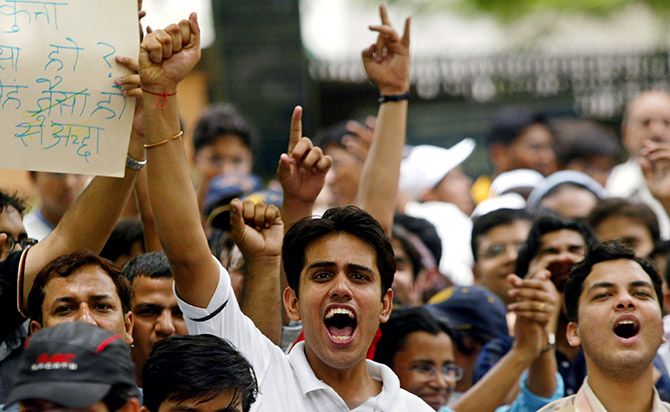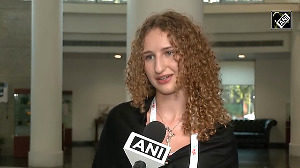The health ministry's decision to deny 82 medical colleges renewal permission may deliver a death blow for medical education in India, warns Dr Arun Jamkar, former vice chancellor, Maharashtra University of Health Sciences.

The news that the Union ministry of health and family welfare denied 82 existing medical colleges renewal permission (external link) for the academic session 2018-2019 due to non-fulfilment of various criteria has sent many aspiring doctors into a state of panic.
On the one hand, the honourable prime minister is speaking about the need to increase the number of doctors in the country and grandly announced the setting up of new medical colleges as well as conversion of district hospitals into medical colleges, while the health ministry prefers a different approach to the situation.
In one single stroke, the ministry has effectively reduced 13,800 MBBS seats available nationwide.
To put it in proper perspective, in the previous year, around 65,000 students had sought admission in government and private medical colleges across the country.
This is indeed an alarming situation and something the country cannot afford at the present time.
To break down the figures released by the health ministry -- a total of 31 government and 37 private new medical colleges have been banned (a total of 8,950 seats); four government and five private medical colleges have been denied increase in seats (650 seats) and 12 government and 70 medical colleges from accepting additional students, say from 50 to 100, or 150 to 200, etc (4,200 seats).
This comes to a whopping decrease of 13,800 potential doctors for this year alone.
What is even more shocking is that the government is hiding behind technicalities and claims that this is on the basis of the Medical Council of India's recommendations.
However, in the case of at least two colleges in Maharashtra, the MCI had cleared the colleges after carrying out surprise checks and this recommendation is available on the MCI Web site (external link).
It is also pertinent to note that the names of these two colleges appear twice on the list, making us wonder if the list was even checked at all before release.
The overall aim of the ministry seems to be commendable, namely to take corrective measures to clean up the mess that medical education finds itself in the country.
As per WHO recommendations, the doctor to population ratio should be 1:1,000. However, at present, in India, this ratio is 0.62:1,000.
Many sitting and former vice chancellors of health sciences universities believe that the existing infrastructure in medical colleges -- which have been recognised for at least 10 years -- is sufficient to increase the intake of medical students by an additional 25 per cent.
This will effectively increase the number of medical seats in all existing medical colleges.
As a net effect, the medical seats will increase from 67,000 to 80,000, which will increase the doctor to population ratio so as to meet WHO standards by 2022.
There should be zero tolerance to sub-standard medical education in the country, but corrective measures need to be taken keeping in mind many other pressing issues such as the burgeoning cost of a medical degree and the massive shortfall in healthcare professionals.
A closer look at the list reveals that most of the government colleges that are debarred from starting, renewal or increase in seats are actually located in mofussil areas, remote and smaller towns and smaller cities that need medical facilities.
The infrastructural deficiencies in government institutions are also directly related to a lack of timely release of funds by some other ministry and so it is a vicious cycle that never ends even as the students suffer.
While nobody wants the standards of medical education to be diluted, punitive action as is being taken by the ministry is not warranted.
Instead, the ministry should take corrective action by putting these institutions under close watch to take suitable action in a time-bound manner. It could deploy experts nominated by the MCI or the ministry itself to oversee the remedial measures.
Sshutting down medical colleges is not the right approach.
What is instead proposed by a former vice chancellor of the Maharashtra University of Health Sciences is the use of a matrix as detailed below.
This matrix does not mandate a pass or fail approach to evaluation, but a proportionate assessment with emphasis on vital areas.
This will enable colleges to carry on their normal functioning while also being put on notice to make up their deficiencies.
The only hope is that the prime minister's office takes serious note of the health ministry's action of not only shooting itself in the foot, but also going against the prime minister's wishes and takes immediate corrective action.
This alone will save the country and protect the interest of thousands of medical students, especially those that deserve it the most.
As this article was being e-mailed to Rediff.com, it is learnt that the honourable Supreme Court of India has ruled (Order no 662 and 735 of 2018 dated 09/07/18) in favour of one college affected by this seemingly random decision, which had approached the apex court and has asked the Government of India to look into similar cases of five other colleges that had not approached the Supreme Court.
This is a very positive and progressive decision, indicative of the concern that the Supreme Court has for the quality of medical education in India and the doctor-patient ratio in the country.
Photograph: Adnan Abidi/Reuters. Kindly note that the lead image has been published only for representational purposes.











 © 2025
© 2025